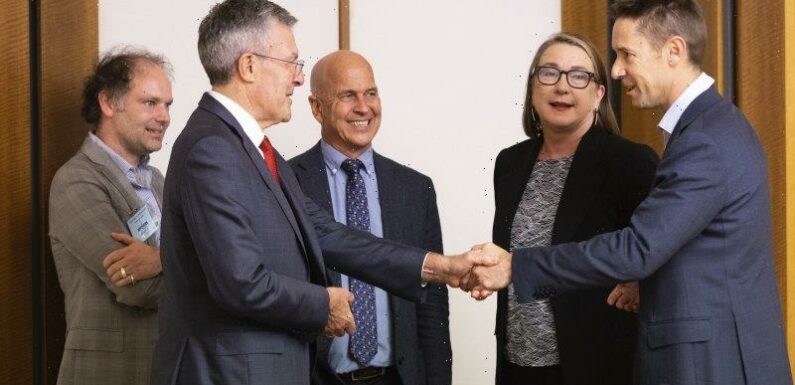
Australia’s major media bosses united on Monday to push for changes to stop police being able to raid journalists “just for doing their jobs”, and to fix Australia’s beleaguered freedom of information regime.
At a closed-door meeting with Attorney-General Mark Dreyfus in Canberra on Monday, executives from publishers including News Corp, The Guardian, the ABC and Nine pressed their case to the government over its proposed reforms to privacy law and commitment to enacting recommendations stemming from the 2019 raids on the ABC and then News Corp journalist Annika Smethurst, who now works for The Age.
ABC managing director David Anderson, journalist Laura Tingle and Attorney-General Mark Dreyfus before a meeting with media organisations.Credit: Alex Ellinghausen
Dreyfus told the meeting that he had been shocked by those raids.
“I think that journalists should never face the prospect of being charged just for doing their jobs and there is agreement across the parliament and indeed the community that improved protections are overdue,” Dreyfus said in prepared opening remarks.
“Unlike the former government which ignored not one, but two separate bipartisan committee reports, the Albanese government intends to progress press freedom and protection of press freedom.”
The Australia’s Right to Know coalition, which includes most major Australian publishers along with the media union, pushed for more.
“The government, when in opposition, said that while a good start, many of these recommendations don’t go far enough to deliver better outcomes for media freedom and the public’s right to know,” a coalition spokeswoman said in a statement. “We agree.”
The Morrison government gave full or in-principle endorsement to a suite of changes from an inquiry into press freedom but did not enact laws to give them force.
Media representatives raised topics at the meeting ranging from increasing access to court documents, which are often suppressed, to greater protections for whistleblowers, and further modifications to Australia’s onerous defamation laws.
The percentage of freedom of information requests that are more than 90 days late has increased about tenfold over the last decade. The government has introduced the first tranche of reforms to protect whistleblowers, with the planned laws before parliament, and a review of secrecy has begun.
A review by the Attorney-General’s Department in February proposed allowing people to sue for serious invasions of their privacy, intending to protect Australians from intrusions into their homes and digital lives. However, similar laws overseas, such as in the UK, have allowed bankers and celebrities to suppress true but embarrassing stories such as affairs and drug use. That has rankled the media. The government has not decided on the proposals and is considering the review.
“We look forward to working with the government during this parliament to deliver meaningful and material law changes to strengthen media freedom and bolster our democracy,” the media coalition spokeswoman said.
Nine is the owner of The Age and The Sydney Morning Herald.
Most Viewed in Technology
From our partners
Source: Read Full Article
